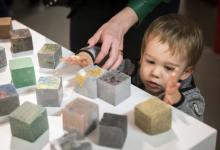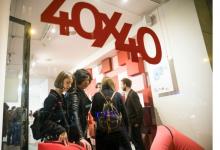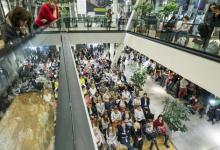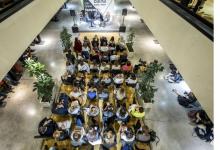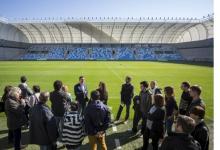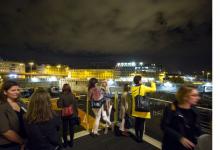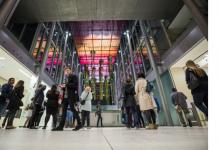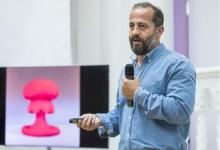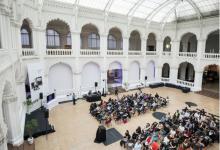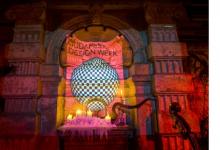Budapest Design Week 2017: START
This year’s Design Week Budapest focused on business development, digitalisation and Danish design. The program that took place for the 14th time was closed on 15 October. The series of programs was patronised and sponsored by the Hungarian Intellectual Property Office and coordinated by the Hungarian Design Council.
Budapest Design Week embraced about 160 events in Budapest and about 100 events in three partner cities: Győr, Pécs and Sopron.
Under the slogan START, the major themes of this year’s Budapest Design Week were starting and developing businesses, managing small and medium-sized enterprises in the creative industries and the challenges of development, the phase of entering and acquiring new markets. The event programs were connected to these themes, placing an emphasis on the unique aspects of the professional field.
Paradigm shift: attendees of the conference ‘Creative industries, digitalisation’, which took place in the building of the Bálna in a collaboration with the Municipality of Budapest, discussed about the coming introduction of Industry Strategy 4.0, the interfaces of digitalisation, urban development, product design and product manufacturing in an exclusive workshop in the morning, with the participation of prominent actors of the relevant industries, and then in a public conference in the afternoon.
The program was joined in a video conference by the industry expert József Cselényi, a Board Member of the Hungarian Furniture Association, who helped to present the integrated company management and manufacturing model of SCM Group and YourCad, which is a digitalised furniture production system envisioning the furniture industry of the future that is going to respond to market demand in real time in an efficient and flexible way. At the conference dr. Viktor Łuszcz Viktor, President of the Hungarian Intellectual Property Office and the Hungarian Design Office underlined the importance of a comprehensive digitalisation, technological innovation, improving skills of the competent creative experts and the efficient communication between various industry actors in the Hungarian industry of the 21st century.
Like in the previous years, creative industry investments were some of the most popular themes on the InvestPlacc froum, which is a full house event from year to year. Participants could learn about the current opportunities in the investment market, with a special regard to the options of exterior market validation at the morning lectures, and they could also hear about the areas where early-stage businesses in the creative industries have to develop further and change to become attractive, serious and reliable partners for investors. Similarly to the previous years, the lectures were followed by B2B meetings where participants could personally meet with various key figures of the investment market. The program was coordinated by the Digital Welfare Nonprofit Ltd and the Hungarian Private Equity and Venture Capital Association.
The conference ‘Design as a business approach: what is service design?’ focused on a special professional field within the domain of design. Service design that can be implemented very efficiently in business development and management is one of the areas that have demonstrated the fastest growth globally. An increasing number of micro and small and medium-sized businesses are offering these services to companies in a wide range of sectors.
Conference lecturers brought some examples, case studies and they offered general, non-industry-specific advice about the opportunities of implementation of service design.
These exciting and popular conferences were multiply over-booked by visitors.
The invited star designers of this year’s Budapest Design Week also focused on business development: Michael Anastassiades, the designer and manufacturer of lighting products, successfully both as a designer and as a businessman, offered practical advice to the conference attendees on the successful combination of the two tasks at the conference which was held at the Museum of Applied Arts.
Danish designer Johannes Torpe placed an emphasis on the openness to innovation in his lecture at the Moholy-Nagy University of Art and Design Budapest. He also stressed the role of extreme flexibility and rapid response to changing demands in the development of design businesses and underlined the importance of human relations that have to be respected also by introvert and artistic designers.
Star designer Marcel Wanders spoke about the opportunities of economic return on starting a business in his lecture. Besides doing some design activities, he has also appeared as an investor in the property business of Budapest recently.
The opening exhibition ‘START – Elemental design’ of Budapest Design Week presented other successful businesses with a proven track record and numerous opportunities of investment. The exhibition that was hosted in Artus Studio showcased various objects, products and concepts inspired by the geographical characteristics of the country such as soaps Zador, which are made of Hungarian thermal water and fragrances, or the crockery HIDE, designed by porcelain artist Máté Kovács in an inspiration of wind-blown sand of Kiskunság.
Visitors could meet several early-stage businesses and some new talents at the exhibition that was organised to showcase the Hungarian Design Award winners and their works. The exhibition was also hosted by Artus Studio, simultaneously with the exhibition ‘START – elemental design’. Visitors could find an exhibition of the Design Management Award 2017 winners, companies that implement design at a strategic level at the same place.
Denmark, the honorary guest country to Budapest Design Week 2017 presented several examples to prove the significant market success resulting from a continuous business development, especially in the field of manufacturing and distributing design furniture and accessories. It often happens that designers in the Scandinavian country attain success by launching their own products and brands in the market. They are pursuing a strategy that has grown into one of the most successful business models since the economic crisis. Due to the popularity of the Danish taste of life ‘hygge’ and the diversity of programs relating to the honorary guest invitation, one cannot be surprised that most programs received a lot of attention from the public and the professional visitors alike.
Visitors to any of the Open Studios also received advice on business development: seventeen design businesses of different sizes opened their gates to visitors to present the background of various professional areas of design by offering lectures and answering questions within the framework of the program. The smart design workshop ‘Geek is the New Chic!’ focused on start-ups and technological innovations and they also organised a short start-up contest after the lectures.
Attendees could also get practical advice at the workshops of Budapest Enterprise Agency: the experience of project and product development, the challenges, the successes, the avoidable setbacks and the opportunities to enter domestic and international markets were discussed at the workshop that tried to combine various aspects.
Business development was the major topic of Design Week at the events of the countryside too: programs in Pécs, Sopron and Győr, a city that joined the programs for the first time, concentrated on the introduction of local businesses and their activities in the creative industries, events of networking and further training and the opportunities of establishing international partnerships.
Open4Business, one of the most complex programs of the event series in Pécs invited the representatives, diplomats and company managers from European companies and twinned towns to the headquarters of the Hungarian Chamber of Commerce and Industry of Pécs-Baranya to discuss cooperation opportunities with the local companies.
Apart from the centrally organised programs, participants could also join the events with their own programs, like in the previous years. About a hundred businesses in Budapest and several dozens in the countryside took the occasion to organise events that matched their professional fields, activities and objectives at their premises. Budapest Design Week attracted visitors at about hundred and fifty venues, accompanied by another fifty venues in Pécs, Győr and Sopron, in office buildings, showrooms, galleries, museums, education institutions and workshops, from 6 to 15 October.
To sum up the attention received by the exhibitions that were occasionally open for several weeks after the talks, workshops and programs, the number of 70,000 is a fair estimate of the number of visitors countrywide to Design Week, which basically offered free admission to their programs.
Following the closure of Budapest Design Week 2017, the preparations for next year’s events have already begun. The events in 2018 that will also serve to celebrate the fifteenth anniversary are expected to embrace even more partner cities from the countryside and it will continue to place an emphasis on programs related to the development of design businesses as supported by the good experience of this year. Apart from experimenting with new programs, the organising body of Budapest Design Week, the Hungarian Design Council will definitely include the most popular events such as the introduction of the honorary guest country, the presentations of star designers, the Open Studios, the design tours and the introduction of Budapest Design Map in relation to the world design day in next year’s programs as well. Please contact the Hungarian Design Council Office for more information about the preparations of the events.





